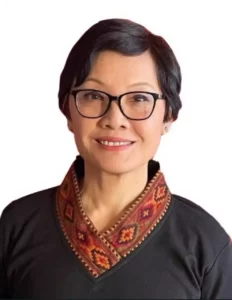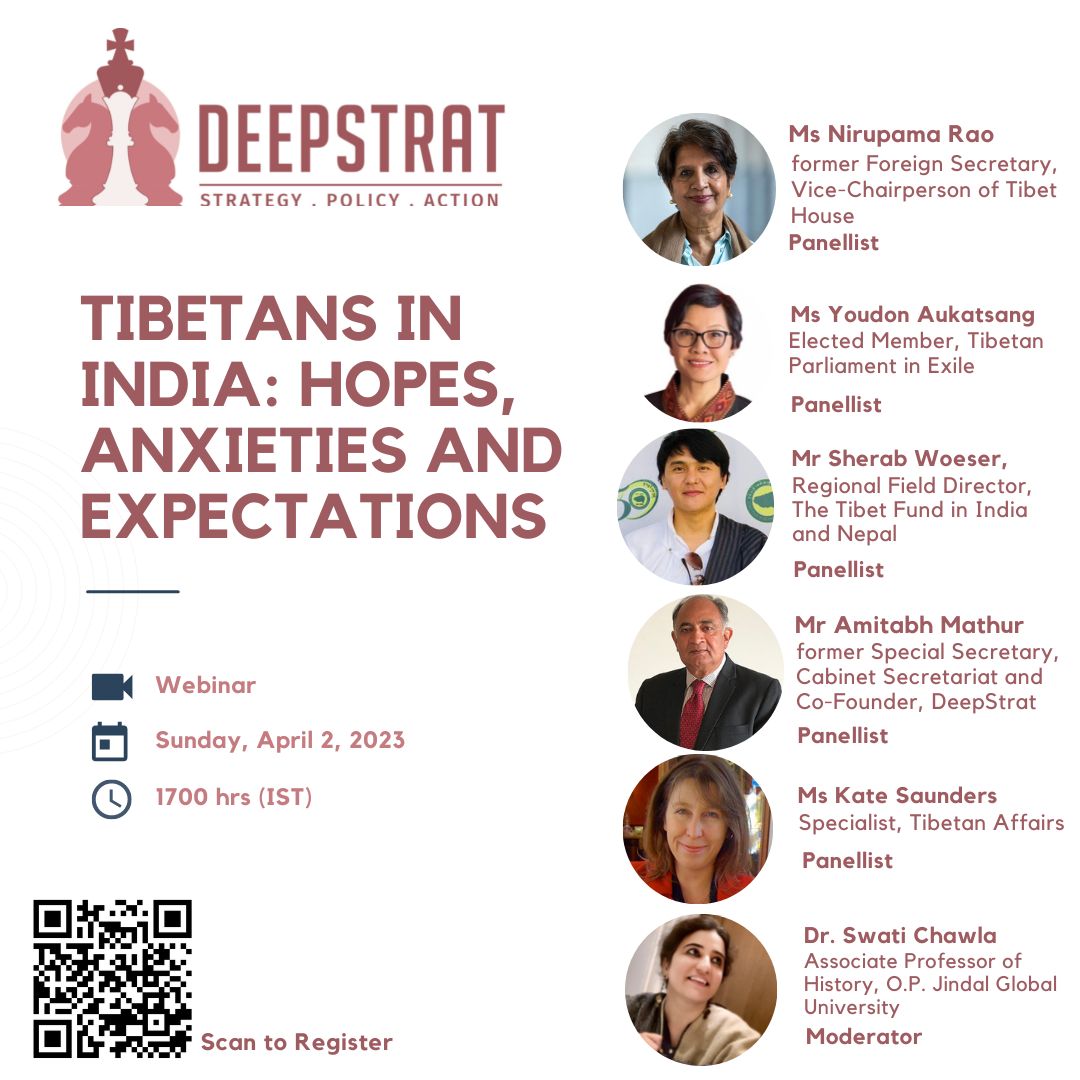DeepStrat is organizing a webinar on ‘Tibetans in India: Hopes, Anxieties and Expectations’
Details of the event:
Webinar: Tibetans in India: Hopes, Anxieties and Expectations
Date: Sunday, April 2, 2023
Time: 1700 hrs (IST)
To Register: https://forms.gle/7E4TAsNNsvQnvuVH6
Addressing the future of Tibetans in India
The Fourteenth Dalai Lama turns a youthful 88 this year. He has lived 64 of those years in exile as an ‘honored guest’ in India, and has often said that decades of eating dal-bhat has made his body Indian. His mind, informed by the Nalanda masters, is also Indian. For many Indians, especially in the Himalaya, the Dalai Lama is a revered religious leader and a unifying presence.
The Central Tibetan Administration was birthed from the Fourteenth Dalai Lama’s desire to democratize and modernize Tibetan society in exile, and create a model system of governance which could serve Tibet upon their return. The Tibetan community in exile in India has long been celebrated as ‘the most successful refugee community in the world,’ is partly composed of a disaffected youth that has little faith in the political and religious leadership and old people whose children are increasingly leaving India for Europe and North America. For the first time since the Dalai Lama came into exile, the numbers of Tibetans in South Asia and the west seem evenly matched, though the official figures from the latest census have not been released.
However, the most pressing challenge is the urgent question of the Dalai Lama’s reincarnation. In December 2022, the Indian Himalayan Council of the Nalanda Buddhist Tradition (IHCNBT) passed a resolution on the contentious issue of the Dalai Lama’s reincarnation, euphemistically referred to as ‘the post Dalai Lama scenario.’ It stated that the people of the Himalayas will never accept a candidate for the Dalai Lama chosen by the People’s Republic of China ‘for political ends,’ and will publicly denounce the move.
In September 2022, the Kashag (Cabinet) of the Central Tibetan Administration reiterated that ‘no government nor any individual has the right to interfere in this matter [of the Dalai Lama’s reincarnation].’ The statement mentioned the endorsement of the Dalai Lama’s wishes on the subject from governments across the world. For example, in December 2020, the United States Congress passed the landmark Tibetan Policy and Support Act, which reaffirmed the rights of the Tibetan Buddhists to choose the next incarnation of the Dalai Lama without any interference from China. The Kashag further stated that it sought to ‘obtain similar support from as many like-minded countries as possible.’ But will international support for Tibet hold after the passing of the Dalai Lama?
And what about the official position of the country which hosts the Dalai Lama and the Central Tibetan Administration? The Indian government has not made a public declaration of its position on the issue yet. Supporters of the Tibetan movement are anxious about how the Dalai Lama’s passing would affect India’s support to Tibetans in exile and its relationship with the Central Tibetan Administration, as well as the impact on Buddhist communities across the Himalaya in the likely scenario of two rival Dalai Lamas and China’s tightening grip on the sacred institutions of Tibetan Buddhism.
This panel discussion brings together experts from among the Central Tibetan Administration, the Indian government, and civil society organizations within India and the Tibetan exile. They will speak on India’s policy towards the Central Tibetan Administration and Tibetans in exile more broadly, including the recently released report by the Foundation for Non Violent Alternatives, a Delhi-based non-governmental organization, titled Resetting India’s Tibet Policy 2022: Repositioning the Future; India’s position on the Dalai Lama’s reincarnation; current challenges in Tibetan settlements across India and the position of local- and state governments; and the role of Himalayan Buddhists in informing Indian public opinion on the Tibet issue.
Panellists for the Webinar
Ms. Nirupama Rao, former Foreign Secretary, Vice-Chairperson of Tibet House, cultural centre of His Holiness the Dalai Lama

Ms. Nirupama Rao was Foreign Secretary in the Government of India (2009-2011) and earlier served as Spokesperson of the Ministry of External Affairs, High Commissioner of India in Sri Lanka and Ambassador to the People’s Republic of China. She was Ambassador of India to the United States from 2011 to 2013. On retirement, Rao was a Fellow at Brown University and also taught there from 2015-16. She was the George Ball Adjunct Professor at Columbia University in Fall, 2018. In 2019 she was a Pacific Leadership Fellow at UC San Diego. She is a Global Fellow of The Woodrow Wilson Center, Washington DC, a member of the Council of the Indian Institute of Science, Bangalore, a Member of the Board of Governors of ICRIER , New Delhi and the Global Board of the U.S India Business Council. She holds a degree of Doctor of Letters (Honoris Causa) from Pondicherry University and is a recipient of the Vanitha Ratna Award of the Government of Kerala. She is the author of The Fractured Himalaya India Tibet China, 1949-1962 (Penguin Viking 2021). Currently, she is the Vice-Chairperson of Tibet House, the cultural centre of His Holiness the Dalai Lama.
Ms. Youdon Aukatsang, Elected Member, Tibetan Parliament in Exile

Ms. Youdon Aukatsang is serving her fourth term as an elected member of the Tibetan Parliament in Exile. She has over 22 years of experience working on issues affecting Tibet and Tibetans and has served in various capacities in Tibetan led NGOs such as Tibetan Women’s Association, Tibetan Center for Human Rights and Democracy and Empowering the Vision Project. She was a Reagan Fascell Democracy Fellow with National Endowment for Democracy, USA in Spring 2021. Ms. Aukatsang holds a Master’s degree in International Law and Diplomacy from the Fletcher School of Law & Diplomacy, Tufts University and a Master’s degree in International Politics from Jawaharlal Nehru University, New Delhi with a Bachelor’s degree from Lady Shriram College for Women, Delhi University.
Mr. Sherab Woeser, Regional Field Director, The Tibet Fund in India and Nepal

Mr. Sherab Woeser is the Regional Field Director of The Tibet Fund in India and Nepal. He was born into a refugee family in Bylakuppe, Karnataka and did his schooling from the Tibetan Children’s Village in Dharamshala. He has over nineteen years of combined experience as an activist, journalist, researcher, and development worker. Before joining The Tibet Fund, he was a Senior Fellow at the Tibet Policy Institute of the Central Tibetan Administration. He has a Bachelor in English Literature from Panjab University and served as the editor of Phayul.com, Tibetan Bulletin, Tibet Policy Journal, and Rangzen Magazine.
Mr. Amitabh Mathur, former Special Secretary, Cabinet Secretariat and Co-founder of DeepStrat

Amitabh Mathur is co-founder of DeepStrat. He served for 32 years as a career intelligence official rising to the top echelons of India’s national security apparatus. He was Special Secretary, R&AW before he was selected to head the Aviation Research Centre, a federal technical intelligence organisation under the Government of India’s Cabinet Secretariat. In his three decades as a career intelligence professional, he specialised on the Pakistan and Afghanistan and the armed militancy in the state of Jammu and Kashmir. He also served as the station chief handling sensitive international security issues with his counterparts in Bangladesh and the United Kingdom. During the Maoist insurgency in Nepal between 2002 and 2007, he also handled the country desk. He was central to negotiations that led to stabilising bilateral relations between India and Nepal. As a diplomat he has served in the Indian embassies in Beirut, Paris, Dhaka and London and has forged extensive relationships with his counterparts and experts across the globe. Post retirement he was appointed by the government of Prime Minister Narendra Modi as a Special Adviser to the federal Ministry of Home Affairs. He advised on the international ramifications posed by terrorism in Jammu & Kashmir, Left Wing Extremism and Tibetan and Buddhist affairs. In this role he forged a close relationship with Tibetan government-in-exile as well as His Holiness, The Dalai Lama and other religious leaders.
Ms. Kate Saunders, Specialist, Tibetan Affairs

Kate Saunders is a writer and author who has specialized in Tibet for more than 20 years, leading fieldwork in Asia and mentoring researchers and open-source monitors; briefing Parliamentarians, government ministries and engaging in U.N. advocacy in Geneva; leading teams and managing media/public relations for high-profile events for instance visits by the Dalai Lama to international capitals. As the former head of Research for the International Campaign for Tibet, Kate managed a field operation of Tibetan researchers, interviewing Tibetan sources and writing analyses on the situation in Tibet. She has produced numerous reports on the situation in Tibet and a book on the Chinese laogai system ‘Eighteen Layers of Hell: Stories from the Chinese Gulag’. Her articles have been published in newspapers and magazines worldwide including The Guardian, The Times, Washington Post, Times of India. Kate is currently working on a report investigating issues around the Dalai Lama’s succession, and a research project, ‘Cartographies of Coercion’, combining OSINT and Tibetan research expertise with the SecDev Group.
The session will be moderated by Dr. Swati Chawla, Associate Professor of History, O.P. Jindal Global University

Dr. Swati Chawla is an Associate Professor of History at the School of Liberal Arts and Humanities, O.P. Jindal Global University. She received her Ph.D. in history from the University of Virginia. Her doctoral research focused on the protracted processes of nation-building and citizenship-making in the eastern Himalaya at the cusp of India’s transition from colonial rule. She teaches courses on the Himalaya, migration, citizenship, and advanced research methods. She tweets @ChawlaSwati and the hashtag #himalayanhistories.
About DeepStrat
DeepStrat is a New Delhi-based Strategic Consultancy and Think Tank specialising in Risk Management and integrated solutions to business continuity threats across sectors.
It was founded with the vision to combine rich experience in government with the best talent available in the private sector to produce sustainable solutions. At DeepStrat we focus on a broad spectrum of issues – Risk Assessment & Mitigation, Cybersecurity, Technology, Sustainability, Governance, Capacity Building, Foreign Policy, Defence and Public Policy.


